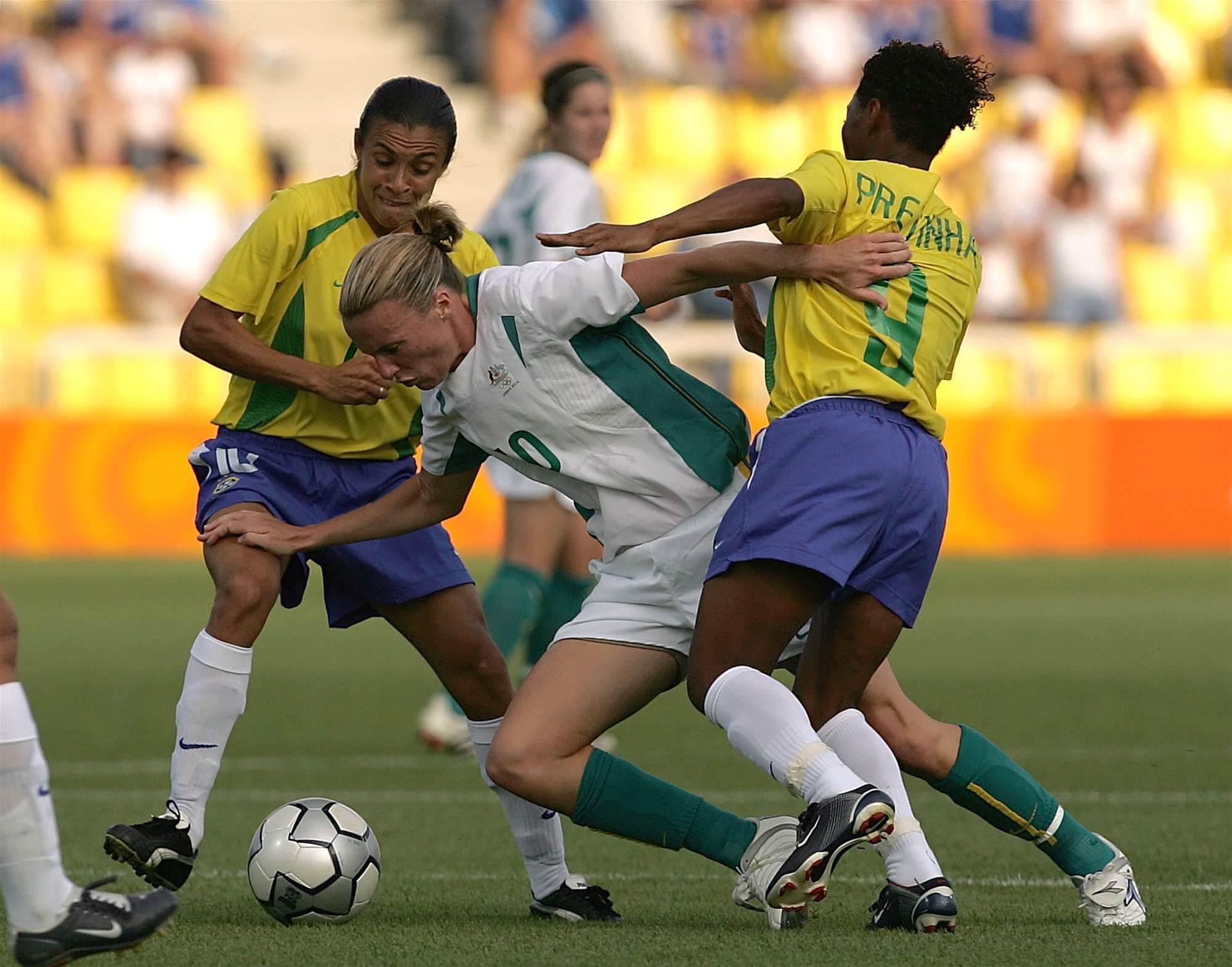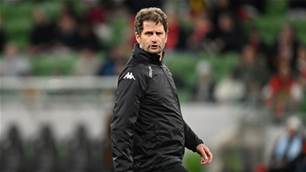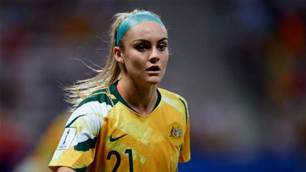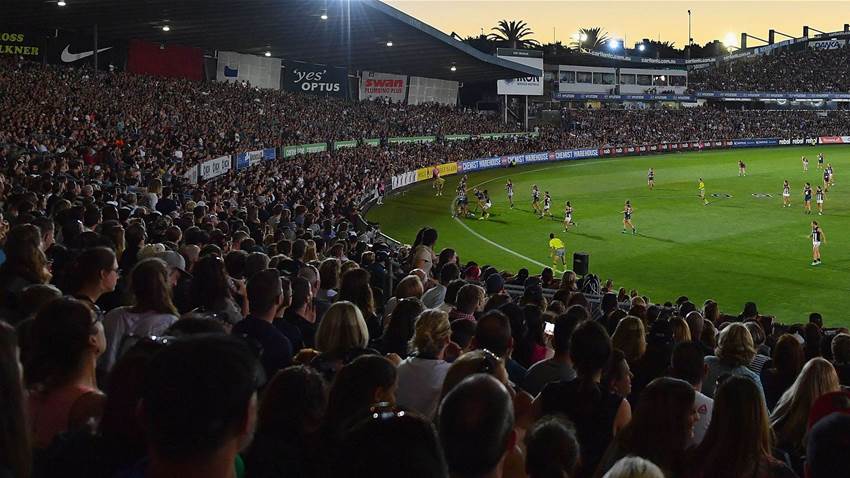Former Matildas vice-captain Joey Peters has weighed into the code wars believing the launch of the AFL women’s league (AFLW) has taught the FFA a lesson in marketing the W-League.
The AFLW’s first match between Carlton and Collingwood at Ikon Park got under way last Friday in front of a capacity crowd.
More than 1000 fans, including Matilda and Melbourne City star Steph Catley, were unable to gain entry with gates closed and reopened at three-quarter time.
The attention given to the new women’s competition has been vast with all fixtures to be broadcast live on pay TV and selected matches on free-to-air, the AFL website and league’s app, with free entry to games except for some double header matches.
“We can just take lessons from their (AFLW) marketing," Peters told FourFourTwo.
"They had free admission, now I don’t know how much of an impact that makes but the thing was when they started to get the lockout. Then you can start to say ‘well, now it’s worth something’.
“So now people will be wanting to pay and it’s proven now it’s valuable. I think that was really a masterstroke to put it on for free."
Peters comments come ahead of today’s W-League Grand Final between Perth Glory and Melbourne City at nib Stadium from 4.30pm (AWST).General public tickets for the decider will cost $20 for adults and $10 for junior/concession.
The match will clash with AFLW Fremantle’s inaugural home game against Brisbane Lions as the first bounce lands at 4.05pm (AWST).
Peters added: “The (AFLW) games are on prime time. Channel 7 is very accessible and I’m not from an AFL background at all.

“I haven’t been able to fully watch a whole game of men’s AFL. It’s nothing against the sport, but there’s something about strong women being able to show they can play. I just wanted to support that and I really enjoyed the games, the commentary, the interviews and the whole marketing package around it.”
Couldn't get into Ikon Park tonight to watch the #AFLW because the stadium is at capacity. It suuucks but how good for women's sport 😍
— Stephanie Catley (@stephcatley) February 3, 2017
Peters also said she did not feel there was any competition within training environments, believing all female players were striving for the same goal.
The former Newcastle Jets attacking-midfielder drew examples from the three W-League players who currently feature in the AFLW, including two Canberra United teammates co-captain Ellie Brush of GWS Giants and Jenna McCormick of Adelaide Crows.
Both Brush and McCormick made their debut in Round 2 of the AFLW season after they committed to the W-League as Canberra fell 1-0 to City in the semi-final and will return to the round ball next season.
The first high-profile code hopper from football was former Melbourne City and Matilda goalkeeper Brianna Davey who now plays for Carlton Blues. And Perth Glory captain Sam Kerr admitted to FourFourTwo in December she had discussions with the AFL, but saw more opportunity in football.
“We’re pushing each other forward with sport," Peters said. "The question is would the federations be able to work together to promote women’s sport?
“I think they are teaming up in ways that matter like looking after the players. I know (former Canberra coach) Rae Dower was very supportive of the girls she had playing in the AFLW, I think that was massive.
“Just getting coaches and even hearing about Sam Kerr, just being encouraging about it, not competing against each other.
“Women’s sport is the same product, but then you’ve got different codes but we’ve got to work together more. Coming from my background I watched an AFLW game and I was just inspired by them.”

Peters was a W-League expert analysis in selected broadcasted games and said the next stage was for all W-League games to be broadcast in order for people to start taking it more seriously.
Love being able to watch so many of the @aflwomens games on fox. Even replays of games. Something to aspire to in the @WLeague
— Georgia Yeoman-Dale (@gyeomandale) February 11, 2017
An eyebrow raising incident occurred in the second W-League semi-final as Canberra United’s Lisa De Vanna elbowed unsuspecting City interim coach and midfielder Jess Fishlock from behind, causing her to go to ground. The incident was missed by referee Rebecca Durcau.
De Vanna escaped sanction due to the fact there is no Match Review Panel for the W-League (or the NYL). The view being because not every game is broadcasted, it would be inconsistent to adjudicate such incidents.
I'm gonna complain about the lack of broadcasting until I can't complain about it
— Marissa Lordanic (@marissalordanic) January 3, 2017
“It’s got to be done (broadcasting)," Peters said of the W-League contrasting it to the AFLW where you "get to watch all the teams properly".
“You start to know all the players more, follow a team every week and that then breeds the culture of getting into a competition.
“It was very difficult even as a commentator to not have access to watching all the games so it’s got to be the next step.”
A total of 19 double headers with A-League fixtures and 17 broadcast matches were headlined in this season’s W-League draw.
The former Matilda also felt it was important to keep double headers to help expose women’s football in Australia.
She added: “Until you actually promote the same way as the A-League, we’re not going to see the full potential, so it’s got to keep moving that way. It is moving but we need to keep pushing forward as well.”
Related Articles

'Timing not right': Montemurro's verdict on Matildas vacancy

Matildas: 'Fourth at the Olympics is honestly the worst place you could come'
.jpg&h=172&w=306&c=1&s=1)













